The End Of The World Is Near, Let It End It Won’t Be A Pity
“The end of the world is near,
it doesn’t matter, it is ugly,
it doesn’t matter, it is ugly…”
Before his last film Migrations, Alexandar Petrovic considered It rains in my village his best film.
(Biće skoro propast sveta nek propadne nije šteta)

| Production company: | Avala film, Beograd 1968 Les productions artistes associés S.A. Paris |
| Screenplay: | Aleksandar Petrović |
| Director: | Aleksandar Petrović |
| Set Design: | Veljko Despotović |
| Cinematography: | Alain Levent, Djordje Nikolić |
| Film Editing: | Katarina Stojanovć |
| Choice of Music: | Aleksandar Petrović, Vojislav Kostić |
| Music: | Biće skoro propast sveta(Todor)Divan je kićeni Srem (Nikola)Ciganska je tuga pregolema (Todor i Đoka Bas)Što se bore misli moje (Nikola)U selu bejaše ciganka stara (Todor, Nikola, Đoka Bas, Čika Miša)U pustinji čuvao sam svinje (Mija Aleksić)I mi smo Sremci (Đoka Bas, Todor, Nikola, Čika Miša)Slava Srbinu (Nikola, Čika Miša, Đoka Bas, Todor) Bećarci (Nikola, Todor, Đoka Bas) |
| Cast: | Annie Girardot, Ivan Paluch, Eva Ras, Mija Aleksić, Dragomir Bojanić-Gidra |
Gallery:
Press book:
Press book 1968.
After “I even met Happy Gypsies”, Aleksandar Petrovic has numerous interesting proposals from Hollywood; however, he chooses to stay independent. He feared he’d be forced to make commercial films. His European proposals allow him more artistic liberty. He wanted to continue to make real “auteur” films. Thankfully, the “Artistes Associés de Paris” wanted to make a film with Petrovic. He proposes a possible subject for this film.
Inspired by true facts (a father took the blame for a murder that his son was accused for) and by “The Possessed “ by Dostoyevsky, Petrovic discovers that the subject and various elements that enter in the construction of his film are a product of the current political and social situation.
This musical film, mixed with fantastical elements, differs from his other films due to its’ internal structure and its’ formal technique. A small, local group of gypsy musicians played the music for the film and, through the lyrics of traditional gypsy songs, was able to reflect the plot, the images and the thoughts of all of the characters.
The arrival of a professor in the small village begins to create chaos due to the effect she has on the men of the village.
![]()
Plot Summary:
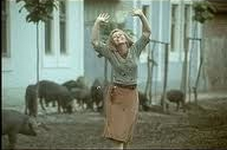
Eva Ras as Gotza
All villages have their designated insane person, at least in Yugoslavia. In the middle of the countryside of Vojvodine, where one can see everything by simply standing up on a squash, the mute Gotza is the town’s crazy person. She vagabonds in her own little world in the dust and mud, until she finds a man, any man, who rapes her and makes fun of her. The swineherd Tricha is different from the others. He protects her.
The other men of the village do not like this. During a wedding, when once again Tricha protects her, the men decide to take revenge. They get him drunk and bring him to a small church to have him marry Gotza. Once Tricha sobers up, he repudiates his crazy wife who gives birth to a son a year later. Tricha’s father decides to take care of the child.
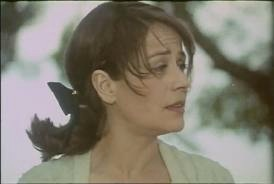
Annie Girardot as the teacher Reza
Reza, a new teacher and an occasional painter, arrives in town. She promises to local authorities that she will teach the women of the town to paint so well that they will be able to sell their paintings in America. The authorities ask Tricha to carry her painting materials every Sunday out in the fields.
One Sunday, Reza decides to paint inside her home, which proves fatal for poor Tricha. She undresses herself, as does he, and what should happen, happens: for Reza this is meaningless, whereas Tricha falls in love. The gypsies sing:
“I will kiss you,
Oh my dear,
I will tell the whole world
From only you will I hide my secret…”
The swineherd is certain that the teacher feels the same way about him, as is confirmed by the town bum, Jochka. Tricha’s hopes and dreams are crushed one hot Sunday afternoon. A plane lands on a tree by accident and the mustachioed pilot falls on Tricha’s head. Milantche, the pilot, doesn’t lose a second: he goes to find Reza who does him a lot better than his plane landing.

Tricha is forgotten. The gypsies sing:
« Trust, trust the beast
do not trust the teacher
her faith is
like the faith of a stray dog… »
The miserable swineheard does not sober up. Jochka and the simple men try to comfort him by explaining that the teacher is looking for an unmarried man and that he has his wife, Gotza.
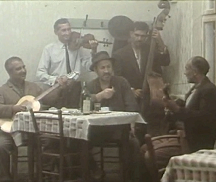
The next day, Gotza is found dead. Tricha’s father says that he is guilty although the police does not believe him. They want to arrest Tricha. In the end, his father is able to convince them of his guilt.
The Gypsies sing:
“The end of the world is near,
it doesn’t matter, it is ugly,
it doesn’t matter, it is ugly…”
Milantche’s plane is fixed and he flies off.
Thinking that things must not have changed, Tricha goes to Reza’s home, only to find a naked military man.
After the pilots departure, the local authorities begin manifesting: they ask for the right to have a plane for their village. We hear: “The students manifest, why can’t we do it too? Down to red bourgeoisie!” Someone proposes: “What if we send a telegram to those that are up there?” Another question: “Who’s up there? The pilots?” The gypsies sing :
“The wind, the wind blows,
The plums fall,
The miserable poor are decaying eternally…”
The demonstrators stop. The villagers suddenly see strange people camping outside the village. These are Czech tourists who ended up there during the soviet invasion of Czechoslovakia. The villagers disperse. The gypsies sing:
“The end of the world is near,
it doesn’t matter, it is ugly,
it doesn’t matter, it is ugly…”
Tricha hasn’t stopped drinking. Everyone makes fun of him. Everyone tortures him. Everyone hates him because his innocent father is in prison instead of him. News arrives of his father’s death in prison. Jochko and the other men take drunk Tricha, tie each of his limbs to the rope of the bell of the church. Tricha struggles, the bells begin to toll.
The villagers arrive in a fury. They hit him and beat him to death.
The next day is election day. The whole village votes. Everyone arrives with flags. Everyone except for Tricha. We bury him. Only a couple miserable villagers and the orthodox priest attend his burial.
The priest preaches in the new church.
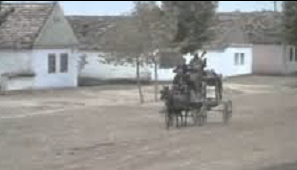
The teacher Reza appears under the porch of the church and stares at the priest with provocative eyes. He begins to stutter, interrupts his homely, sweats and we hear the gypsies sing:
“My eyes are like two little demons,
Two little demons,
Who could have made the priest leave the altar…”
The gypsies are sitting on the hearse that passes through the village and sing:
“Jean made a car without wheels,
Jean made a car without wheels,
He drives it every day,
He is drunk every day.
“Oh, the end of the world is near,
it doesn’t matter, it is ugly,
it doesn’t matter, it is ugly…”
![]()
Awards, honors, festivals:
![]()
Press excerpts:
We find in Aleksandar Petrovic’s “It rains in my village” the same social context and presentation of misery as in “I even met happy gypsies”. This time however, the folklore allows the viewer to focus on a critical and aggressive representation of village life.” Pierre Billard, L’EXPRESS
“…All of it shines with vitality and sexual rage that the ugly is shown as beautiful in a breathtaking manner. An authentic chef-d’oeuvre.” Michel Maurdor, NOUVEL OBSERVATEUR
“… The film shows an atmosphere of reality and make-believe and paints a chaotic picture of the struggle between good and bad in our world.” Aldo Scagnetti
“The story is simple, strong and down to earth but under Petrovic’s influence, it gains meaning. He demonstrates that the population doesn’t change as quickly as governments and ideologies. Even if the film isn’t anti-socialist, he emphasizes on the crises that can come out of difference in opinion and individual theories.” Gene Moskowitz, VARIETY, USA
“Petrovic would have missed humanity if the end of the world ever came. Not knowing how to stop it, he cautions us, all the while knowing that an artist’s work can not stop neither tanks nor bombs. But what would happen if these works multiplied and sparked not ten thousand signatures but millions? Petrovic’s political film is artistic genius; our distributor should hurry up and translate and distribute this film and pay special attention to it.” Otokar Van, FILMOVE A TELEVIZNI NOVINY
“The auteur offers us a sort of villager rhapsody, grotesque but one in which he knew how to stay away from anecdotes and folklore. The lyrical tension, the emotion, the sincerity, the humanism, we are far from a Stalinist film that is supposed to help transform the structure of society. In opposition, Petrovic proves that nothing is changing, that man has conserved in himself a knowledge of good and bad. The most important thing is the brutal and raw way that Petrovic extracts eternal themes in a countryside microcosm.” Hugues Vehenne, LE SOIR
“It rains in my village” is a very painful and aggressive film, with it’s concrete and simple symbolism, with no pity. A passage between the East and the West is opened, it’s the moment of truth, when man decides his own destiny, as a filmmaker and a man. With a style of writing so different than Jancso’s, Petrovic, in a harsh and rigorous way, says almost the same things.” Henri Chapier, LE COMBAT
When the film came out, there were dozens of critiques in the French, Italian, German, Czechoslovakian, Polish and other European presses. Petrovic was recognized as an artist representing modern European cinema.
The Yugoslavian press reproached that he was showing too much misery in the gypsies. He responded “In my film, the gypsies are the same as the Serbs, the Romanians, the Slovaks and others. Actually, I treat my characters ironically, but this is how I treat most people.” A.P.
![]()
Aleksandar Petrovic about It Rains In My Village:
From an interview with Alexandre Petrovic:
It rains in my village is an antipode of I even met happy gypsies.
While the earlier film spoke of the problem of liberty in a world of absolute liberty, with no obligations to society, It rains in my village shows the problem of liberty in a world without liberty, framed by traditions, customs and social and psychological restrictions. Therefore, despite the similar atmosphere, It rains in my village speaks of the problem itself whereas I even met happy gypsies speaks of another aspect of life.
Alexandre Petrovic and Annie Girardot during filming of It Rains in my Village It rains in my village is, in my creative work, the most significant example of the shock between good and bad. I wanted this film to destroy boundaries between reality and make-believe, placing itself in a dreamland and in life. While evolving in this universe of the make-believe, I suddenly discovered that the present, with soviet tanks in Prague, with all the possible subjects of life whether they be social, political, ideological, becomes very relevant in my film. These events become a part of the theme of the film and, given where the film takes place, of reality and make-believe. Because one doesn’t have to be especially smart to realize that what has happened this past year is something that would have seemed impossible a couple of months ago. Starting from my main subject, I discovered, while filming, new elements that incorporated themselves in the film. Furthermore, in the political and social context, these elements incorporate themselves perfectly in the reality of our current world. For example, the portrait of Ernest Che Guevara in the small village of Vladimirovac, or the tents of the Czech tourists in the countryside of Vojvodine, or the torn up newspapers with the picture of the Biafra tragedy. Therefore, it became clear that the subject that is so identical to Fyodor Dostoyevsky’s “The possessed” becomes a clear product of our current world.” (While Petrovic was filming, Soviet tanks invaded Prague, it was the Prague Spring).
…I go to a universe that is, in a certain sense, the measure and the structure of society. I come back to Earth. I don’t have the capability to go off on random themes. For me, only naked man exists, in the psychological, moral and social situation of present day…
…I made the film, with it’s subject and poetic spirit, with the hopes of creating what is to me the most important: and artistic work.
All artistic works, without a doubt, have a social influence, but one cannot exaggerate it because only a Stalinistic approach to art and society started with the supposition that social influence was extremely important and beneficial to human consciousness and the transformation of our world. It is probably because of this supposition that the soviet tanks stayed longer in front of the writer’s association than in front of the army. But this is only an illusion! Art is only a molecule of what forms the human mind. It is sociology’s job to resolve where this influence goes and how it is formulated. My position, from the very start, was not political but poetic. The political implications that come out of my work are the result of a projection of the artistic work in society.
…It is, without a doubt, my hardest film! In it’s creation and in it’s theme. It was hard to connect all of these different forms of mankind, all of these different forms of a human soul. Difficulties in style aside, other questions came up during filming, especially with the actors.
More than for my other films, It rains in my village had a strong contrast between the choices made by these artists. On one hand, the famous star Annie Girardot, and on the other hand, many actors who had never acted. To bring coherence, I was very much helped by the fact that the star of the film, Annie Girardot, was also a great actress.



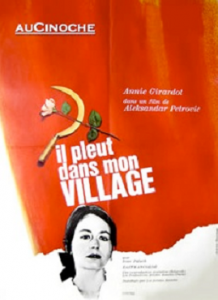
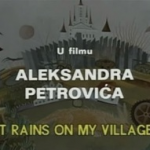
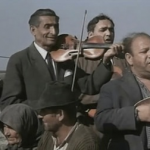
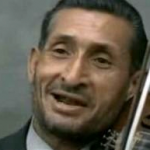
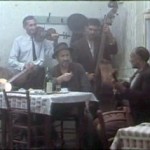
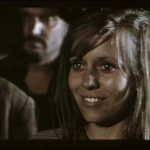
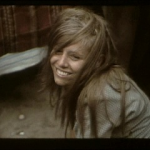
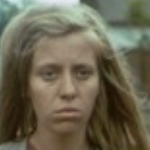
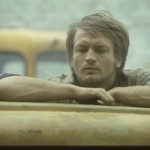

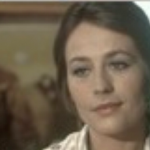
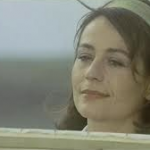
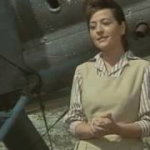
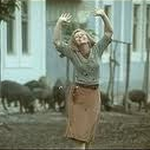
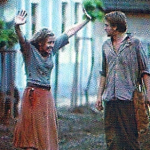
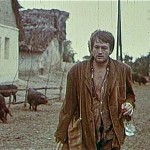
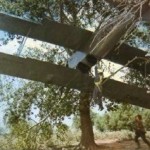
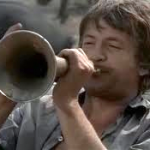
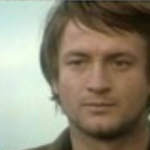
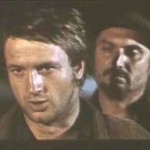
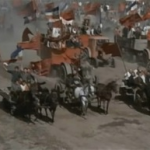
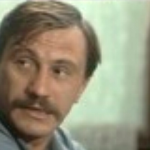
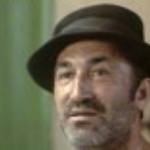
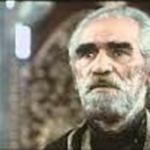
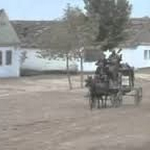
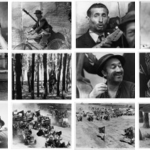
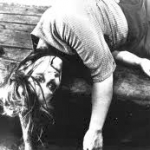
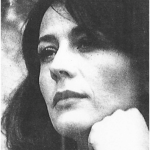
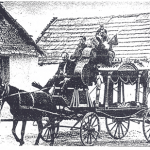
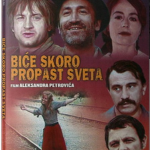
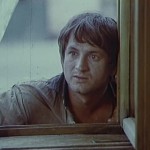
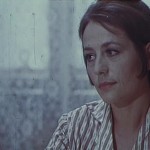
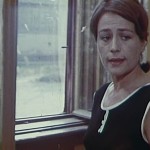

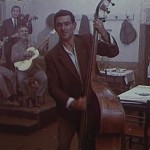

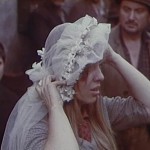
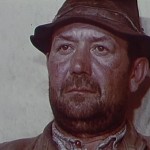
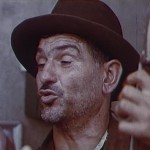
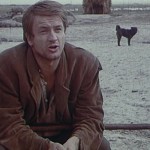
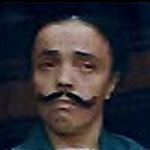
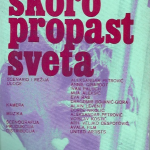
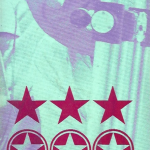
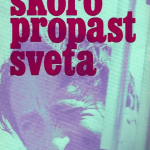

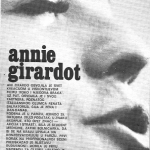
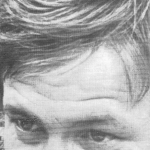
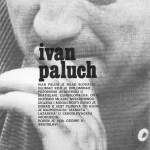
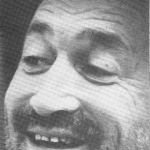
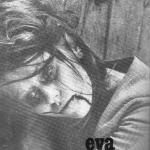
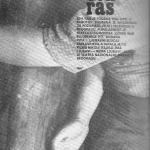
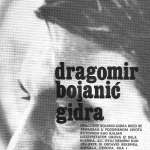
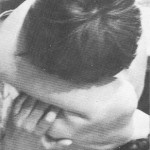
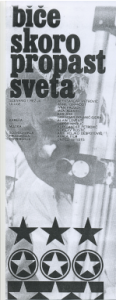

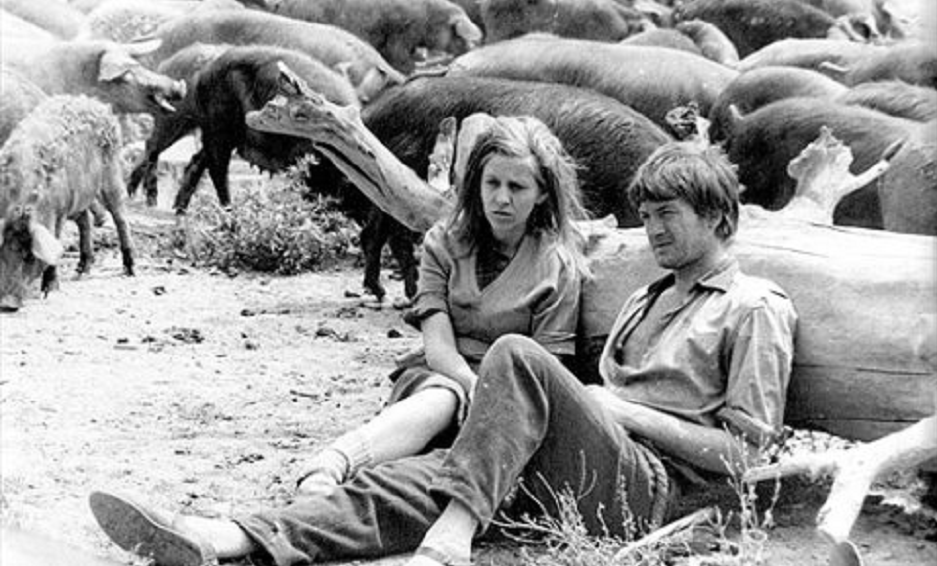
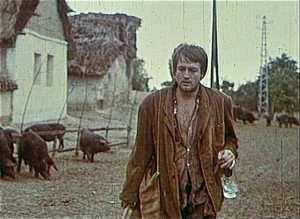
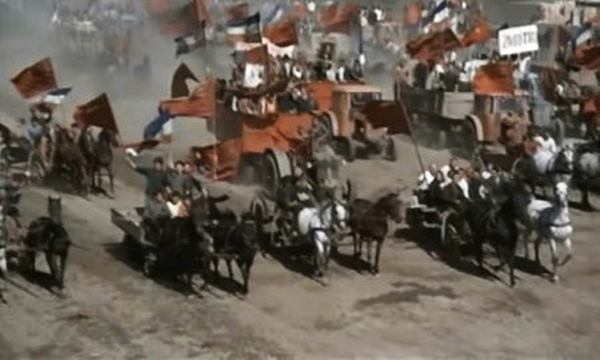
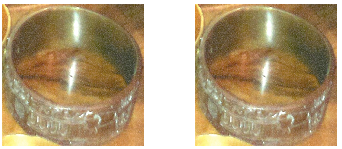
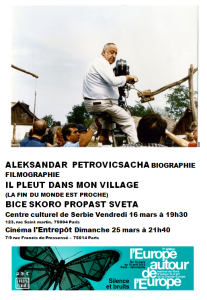


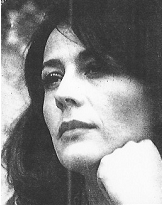
Leave a Reply
You must be logged in to post a comment.